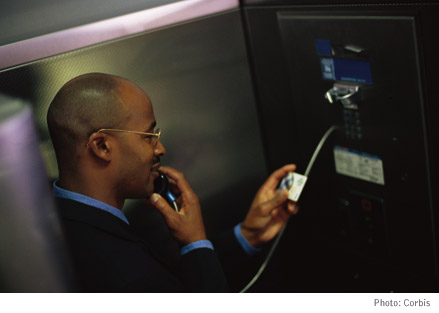


Prepaid Phone Cards: Caller Beware
by Denise Horton


Prepaid international phone cards are replete with hidden charges, according to Julia Marlowe, a consumer economics professor at the University of Georgia.
On a national basis, “this industry has grown from about $1 billion in sales in 1996 to $4 billion in 2004,” Marlowe said, “and the number of cards targeting Georgia’s Latino community has exploded. But we found that in many cases the information provided about the service is either incomplete or misleading, or both.”
Marlowe and a team of undergraduate and graduate students discovered that the cost-per-minute rates for phone cards can be up to 87 percent higher than expected. An expected call rate of 15 cents per minute, for example, may end up costing 28 cents per minute.
Also, companies sometimes measure the phone call’s duration in greater than one-minute intervals, Marlowe said. “If it’s a three-minute interval, you’re charged for six minutes even if you talked for only three-and-a-half minutes. In one case, minutes were rounded at eight-minute intervals.”

While the cost of using the cards was usually far higher than expected, there were a few exceptions. One card that was expected to charge eight cents per minute actually turned out to cost only two cents per minute.
Marlowe’s team purchased 250 prepaid phone cards — at $5 to $10 per card — at outlets ranging from major retailers to small, family-owned stores. Calls were made to Spanish-speaking countries, including Spain, Mexico, Colombia and Peru, calling the same city at least twice on the same card to determine how many minutes were lost to various fees and rounding of minutes.
Prior to making calls, the students, all of them fluent in Spanish, carefully read the information printed on the cards and called the customer-service number to gather more information on fees.
In some cases, information on the front of the card contradicted information on the back, Marlowe said. For example, the front of one card read, “Sin cargo de conexion,” which means “without connection charge,” but the back read, “Cargos de conexion aplicaran,” which means “connection charges apply.” And calling the customer-service number was often unhelpful. In a third of the cases, callers couldn’t reach a representative. When they did make contact, the representative often was unable to answer basic questions about fees or rounding up of minutes.
“There is so much variation in cards and fees that you can’t just go to a store, look through the selection and make an informed choice,” Marlowe said. “Consumers have to rely on their own experiences and those of others to determine which cards to buy.”
They shouldn’t rely too heavily on those experiences, though. She also warned that brands and rates can change frequently. “A card that worked well one time may not be available the next time you look for it.”
For more information, call Julia Marlowe at (706) 542-4851 or e-mail her at jmarlowe@fcs.uga.edu.
For comments or for information please e-mail: rcomm@uga.edu
To contact the webmaster please email: ovprweb@uga.edu
![]()